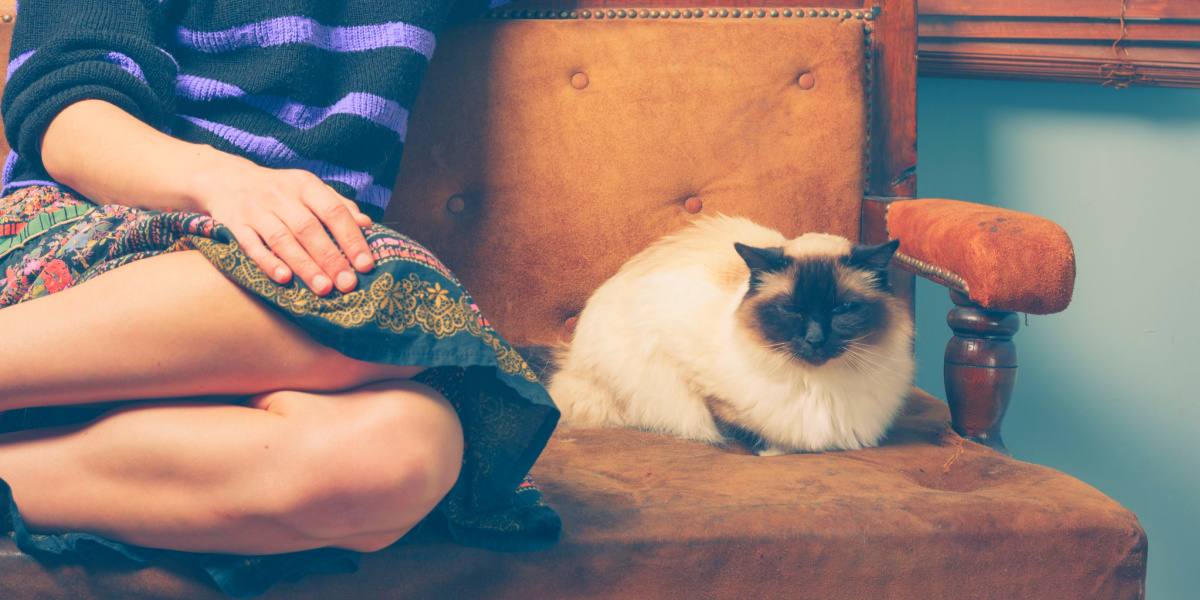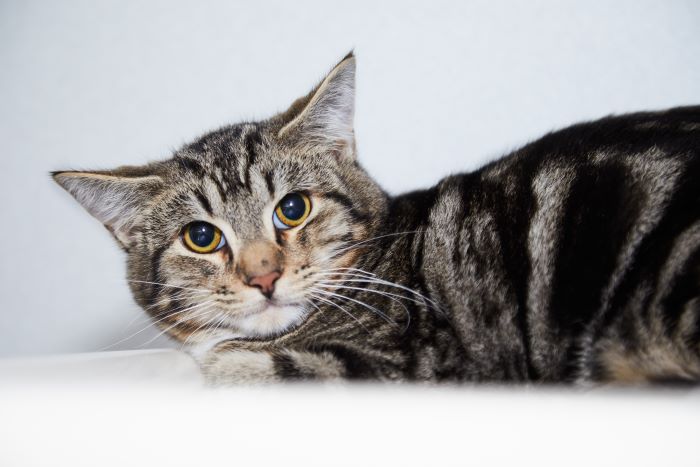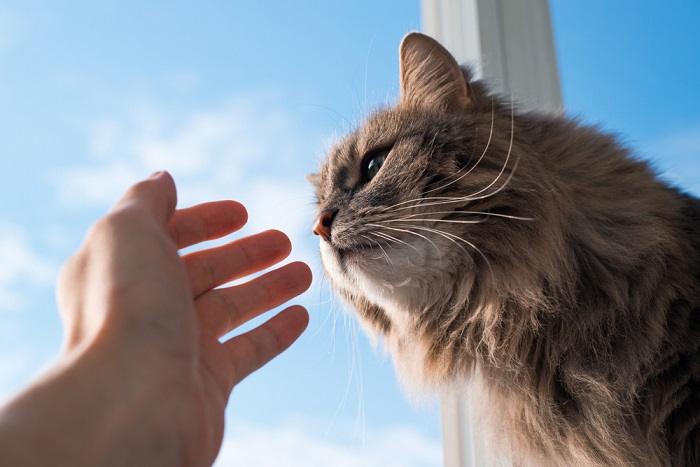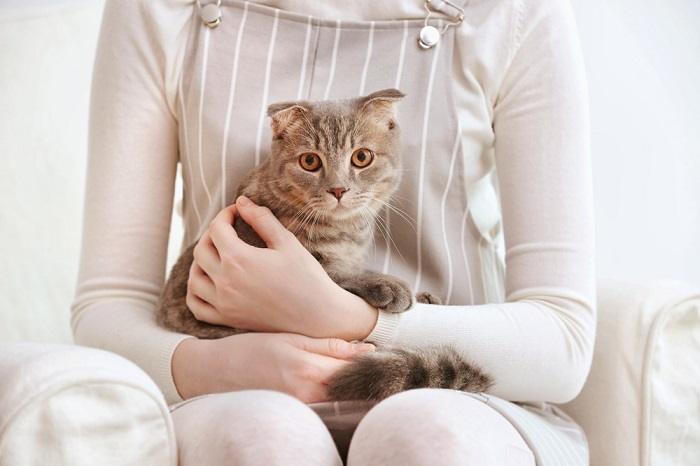
Not everyone is a cat person. Some people are cat lovers whereas others dislike or are even fearful of cats. Of course, if you’re a cat person it’s hard to understand what’s not to like, and you might even worry about your furry family member’s feelings.
Cats can usually tell when a human doesn't like them, but they don’t seem to feel any negative emotions about this. Cats often gravitate toward people who don’t like cats much because they know they can get away if they want to and won't be overwhelmed with human contact. To improve your bond with your cat, look for and respect the signs that they want to get away or don’t want to be touched anymore.Key Takeaways
After all, if your cat realizes that a person doesn’t like them, won’t they be hurt or offended? Well, actually, no. Let’s find out why cats don’t care if you don’t like them, and some might even prefer it!
Do Cats Know if People Don’t Like Them?
Cats are pretty aware of humans and their feelings. They recognize human emotions like sadness, happiness, depression, anger, and fear, and will adjust their behavior depending on their human’s mood.
It’s touching to think that cats want to cheer us up when we’re sad, and if you love cats, a cuddle with your purring cat is likely to make things feel a bit better.
But what if a cat cuddle isn’t very appealing? Cats also pick up on vibes and social cues that let them know whether a person is a cat person. So, if you’re not into cats, a cat will definitely know about it.
Also Read: 8 Ways To Help a Scared and Fearful Cat Be Confident
What Signs Might Tell a Cat That You Don’t Like Them?
If you don’t like cats and you’re visiting a friend who does, you might think you’re keeping your feelings well hidden. However, you’ll be giving out plenty of subtle signals with your behavior and their cat will pick up on them. Here are some examples:
Body Language
If there’s a cat about and you’re not keen on it, you’ll probably act a little awkward. If you’re sitting, you might keep your knees and feet together, keep your hands in your lap, and your back slightly hunched. You’ll probably appear tense and rigid, rather than relaxed, and you might fidget.
You might also avoid eye contact with the cat, and either keep a close eye on them or avoid eye contact completely. Although the cat might not understand the entire spectrum of your behavior, they’re clever and observant enough to notice that you’re not interested or on edge.
Tone of Voice

Cats can pick up on the tones in human voices that tell them if they are wanted around or not.
Cats recognize the tone in people’s voices and can use this information to decide whether they’re being welcomed—or not! If someone who loves cats talks to them, they would tend to use a higher pitch, singsong, voice similar to what many use when talking to babies.
Their voice may also be softer and more calming. If you don’t like cats, there are likely to be traces of fear, irritation, nerves, or anger in your voice, and most kitties will pick up on that.
Lack of Acknowledgment
You might think that by ignoring a cat completely you’re avoiding giving off any signals at all. But a lack of acknowledgment, especially if they’re trying to get your attention, will be an obvious way to show a cat you don’t want contact with them.
If they approach you, meow, or jump onto the chair next to you, it’s not because you haven’t made your feelings clear.
Nervous Energy
People who are afraid of cats are often anxious around them, and the cat will pick up on those nerves. This is because you’ll be tenser, your breathing will alter, and your body movements will be jerky and less relaxed.
Avoidance
It’s not just avoiding eye contact that will give the game away. If you actively move away from a cat when they approach you or walk away shiftily when they’re nearby, you’re making it clear that you don’t like them.
Do Cats Get Upset if You Don’t Like Them?

Unlike most humans, cats don’t seem to feel any negative emotions when someone doesn’t like them.
Humans are social creatures, many of whom want to be liked and tend to people-please. If someone tells you they don’t like you, it can be hurtful and upsetting, and leave you feeling like you’ve done something wrong. Thankfully, cats don’t seem to experience this at all.
Cats don’t seem to feel any negative emotion when a person doesn’t like them, in fact, they seem to quite like it. But why?
Why Do Cats Like People Who Aren’t Cat People?
Seems weird, right? With all the love available from the cat people of the world, why do cats gravitate toward people who don’t like cats much? Aside from maybe trying to convert them, here are a few possible reasons:
They Have Control
Many pet parents enjoy showing their cats copious amounts of affection. This means frequent and lengthy cuddles, endless petting, and almost continuous contact. This is great for us pet owners because petting our cats can relieve stress and improve our mood and well-being.
However, even if your cat likes to be petted, it sometimes gets a bit much for our feline family members. If they approach a non-cat-lover, they’re less likely to get excessive contact and can call the shots when they want the cuddles to be over.
They Can Escape
Although a cat person would never intend it, cats can sometimes feel a bit trapped or claustrophobic if they’re being hugged or excessively petted. If they choose a person who’s not that into them, they know they’ll be able to leave anytime they want. The person would probably even be pleased when they left.
Contact Is Minimal
Sometimes, when you’re petting your cat, less is more. It’s lovely to be able to run your fingers through your cat’s fur, and many cats enjoy it, but sometimes it gets a bit much for them. A person who doesn’t like cats will probably only touch them if they absolutely have to, so overenthusiastic contact isn’t in the cards.
A combination of being able to get away when they want to, and not being overwhelmed with human contact means that your cat might feel safest with someone who isn’t a cat lover.
How Can You Improve Your Bond With Your Cat if You’re a Cat Lover?

Knowing what cats like and dislike can help strengthen your bond.
If you’re a cat lover, all is not lost. Your cat still adores you and you can still offer them far more than someone who doesn’t like cats. However, to strengthen your bond further why not tweak your behavior by taking a few tips from the dark side?
Don’t Overdo It
It’s really tempting when we love our cats to give them all the affection we can muster. After all, they make our hearts feel so full that we want to show them all the love at once. However, if you tone it down a little it won’t be so overwhelming for your cat, and your bond should improve because of it.
Also Read: 10 Surprising Facts About Cat Whiskers You May Not Have Known
Give Them Space and Control
Try not to chase your cat or follow them around. If they’re moving away, it’s because they’ve had enough and want some alone time. This is especially hard for young humans, who have the best of intentions but can get overexcited when the cat is around.
Let your cat come to you, and read their behavior and body language closely. If you spot signs in your cat’s behavior that they want to get away or don’t want to be touched anymore, respect that. Look out for things like a swishing tail, no purr, struggling, nipping and scratching.
In Summary

The more you understand and respect your cat’s individual needs, the more connected you will be.
It might seem odd, but cats like the independence and control that a non-cat-lover gives them. Cats enjoy calling the shots and showing affection on their terms. If you give them back control, your bond will improve and you’ll still be able to enjoy kitty cuddles when the time is right.
Also Read: Why Isn’t My Cat Affectionate?
Frequently Asked Questions
Can cats feel when you don't like them?
Cats know when people don’t like them. They pick up on their body language, behavior, and tone of voice. Don’t expect it to bother them though—cats quite like people who don’t like them!
Can cats sense when you're unhappy?
Cats can sense human emotions like sadness and anger, and have been known to change their behavior when their owners are depressed.
Do cats like people who don't like them?
Cats might gravitate toward people who don’t like them because they have control over the interaction and won’t get trapped in an overzealous cuddle that lasts longer than they’d like.
How do you let a cat know you don't like them?
You don’t need to tell a cat that you don’t like them, they’ll already know from your behavior and body language. However, if you don't want contact with them, you can move away or ask the cat owner if they could move the cat out of the room until you have left.







